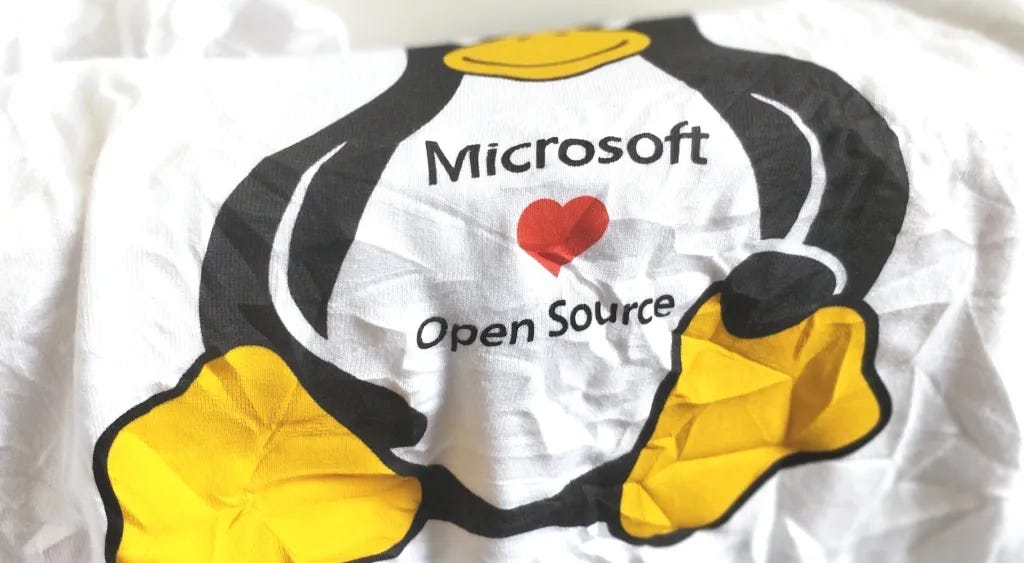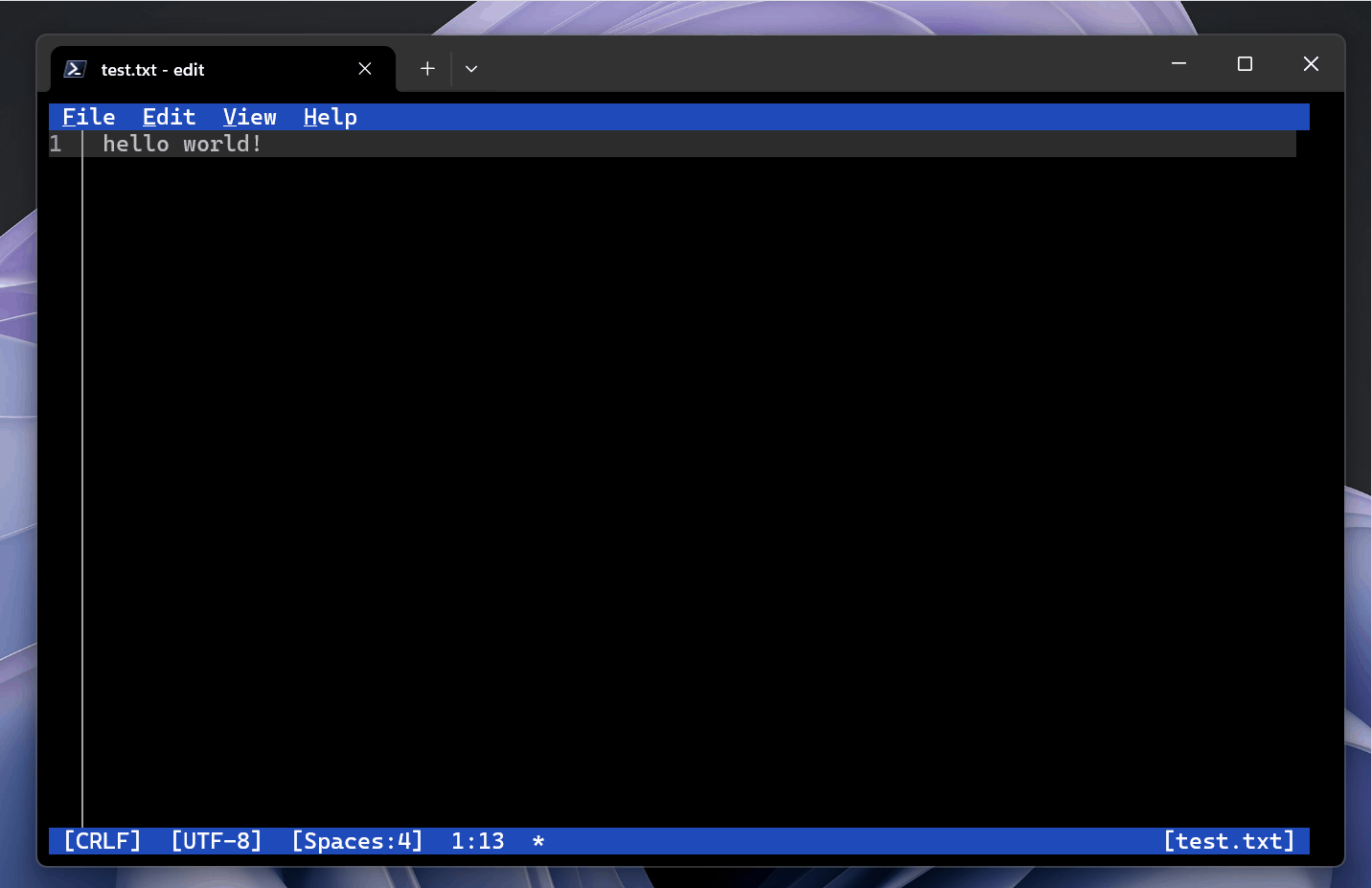Microsoft's (and Linux's) big week in open source
Plus: A new permissive license for open source AI
In this week’s edition of Forkable, I look at a handful of open source announcements from Microsoft, including one particularly notable nugget: the Windows Subsystem for Linux, which debuted back in 2016 to power Linux environments on Windows, is now available under an open source license.
Elsewhere, the Linux Foundation quietly launched a new license designed squarely for open source AI models; Anaconda launched a new unified AI platform for open source; and more.
Oh, and just a heads up — there will be no Forkable next week, so see you first week of June.
As usual, feel free to reach out to me with any questions, tips, or suggestions: forkable[at]pm.me.
Paul
Open issue
The week that was for Microsoft and open source
Former Microsoft CEO Steve Ballmer once called Linux a “cancer,” a sentiment that would come back to haunt him through the years.
However, Microsoft has gone to great lengths to make amends, particularly under the stewardship of Satya Nadella, who has pushed a more “open” strategy since his ascendancy to the hotseat in 2014. For instance, Microsoft open sourced .net Core, joined the Linux Foundation, and acquired GitHub — the go-to platform and community for open source developers — for more than $7 billion.
Of course, this shift from open hostility to active alignment with the open source fraternity isn’t down to altruism. There are many business reasons behind the transition, such as a need to ingratiate itself with developers who love working with open source tooling. And also, to effectively compete in the cloud computing space, with Linux now powering a significant chunk of workloads on Azure.
And so Microsoft continues to embrace an open source ethos where it makes sense to do so. Way back in 2016, the company debuted the Windows Subsystem for Linux (WSL), allowing users to run a Linux environment directly on Windows. This was incredibly useful for easing the friction for cross-platform developers — no more context-switching, rebooting, or worrying about virtual machines.
The very first issue raised on the GitHub repository, however, was whether WSL would be open source; fast-forward nine years, and Microsoft has finally been able to close that issue. At the company’s annual Build conference this week, Microsoft announced that WSL is now indeed open source.
“You can download WSL and build it from source, add new fixes and features and participate in WSL’s active development,” Microsoft senior software engineer Pierre Boulay wrote in a blog post.
But that’s not all. Microsoft also open sourced a new command-line text editor for Windows called Edit, which it says is an homage to the classic MS-DOS Editor. The code is already available on GitHub under an MIT license for anyone to run manually, however, Microsoft said that it will be shipping the CLI text editor natively in Windows in the future. It’s currently available in preview as part of the Windows Insider Program.
Finally: Microsoft also announced this week that it’s making the GitHub Copilot Chat extension in VS Code open source.
“This is the next and logical step for us in making VS Code an open source AI editor,” the company wrote in a blog post. “It’s a reflection that AI-powered tools are core to how we write code; a reaffirmation of our belief that working in the open leads to a better product for our users and fosters a diverse ecosystem of extensions.”
Read more: The Windows Subsystem for Linux Is Now Open Source [The New Stack] // Edit is now open source [Microsoft blog] // VS Code: open source AI editor [VS Code blog]
Patch notes
A new licence for open source AI
The question of what qualifies as “open source AI” is unlikely to be resolved any time soon, partly because the unique demands of AI aren't fully compatible with traditional open source software licenses.
This is something that the Linux Foundation is trying to address with OpenMDW, a new permissive license designed squarely for AI models.
As my old colleague Frederic Lardinois reported over at The New Stack, OpenMDW is trying to mesh the best of the Apache 2.0 and MIT licenses, which are popular options for AI models at present.
The OpenMDW originates from the Model Openness Framework (MOF), introduced by the Linux Foundation last year to help users evaulate the degree of “openness” that a given AI model has. However, the MOF’s practical complexities spurred the Foundation to go further, and develop a license designed to bring clarity to any given open source AI model.
“The Model Openness Framework, in its initial version, was not that easy to deploy,” Matt White, GM of AI at the Linux Foundation, explained in The New Stack. “It requires multiple licenses for data sets, and a different set of licenses for source code. And so we always thought there’s going to be a need to actually have a license that can cover all of this. And that’s where the OpenMDW was born out of.”
Read more: OpenMDW is a new permissive license for AI models [The New Stack]
A ‘unified AI platform’ for open source
Anaconda, a company built atop the open source Python and R distribution that helps data scientists build, test, and deploy data-centric projects, unveiled a unified platform to better enable enterprises to build AI systems without compromising on speed or security.
The Anaconda AI Platform, as it’s called, is all about helping companies use open source Python tools for AI development. This includes helping teams manage and access vetted packages and track what they’re using, replete with role-based access control and related governance features.
For context, Anaconda claims north of 47 million users, and more than 1 million enterprise customers globally — this includes Microsoft, Snowflake, and Panasonic. With the AI industry leaning further toward the open source realm, Anaconda saw a gap.
“Until now, there hasn’t been a single destination for AI development with open source, which is the backbone for inclusive and innovative AI,” Anaconda co-founder and chief AI and innovation officer Peter Wang said in a statement.
Read more: Anaconda unveils the first unified AI platform for open source [press release]
Open source red-teaming
Operant AI, a cybersecurity company specializing in real-time protection for cloud and AI applications, launched a new open source red-teaming product called Woodpecker.
Red-teaming is a cybersecurity practice that involves simulating real-world attacks on an organization’s systems and processes. Woodpecker, available under an Apache 2.0 license, is designed to “bring the power of automated red teaming to your fingertipt,” helping organizations uncover weaknesses in their AI, APIs, and Kubernetes.
“Security vulnerabilities don't discriminate based on an organization's size or resources — we believe red-teaming should not be a privilege for a few, it should be a foundational practice for all,” Operant AI co-founder and CEO Vrajesh Bhavsar said in a statement. “With Woodpecker, we're leveling the playing field by providing enterprise-grade red teaming capabilities in an open-source solution that any organization can deploy. Security testing at this depth should be a universal right, not a privilege reserved for those with the largest security budgets.”
Read more: Introducing Woodpecker: Open-Source Red Teaming for AI, APIs, and Kubernetes [Operant AI blog]
An open source AI accessibility checker
The Global Accessibility Awareness Day (GAAD) Foundation — a non-profit focused on making accessibility a fundamental aspect of product development — announced a new open source tool designed to evaluate how well coding-focused Large Language Models (LLMs) generate accessible code.
Developed in collaboration with ServiceNow, the AI Model Accessibility Checker (AIMAC) essentially provides benchmarks for companies to “test and demonstrate the accessibility of their models' output.”
“Accessibility must be a foundational requirement as AI reshapes our digital future,” GAAD co-founder Joe Devon said in a statement. “With AI adoption accelerating, there’s a risk of the industry becoming a ‘winner takes all’ space dominated by a handful of companies. If accessibility isn’t prioritized, people with disabilities risk being systematically excluded from AI’s transformative potential. AIMAC helps address this risk by embedding accessibility as a baseline standard in AI innovation.”
Read more: Global Accessibility Awareness Day (GAAD) Foundation launches AI accessibility checker with ServiceNow to advance inclusive code standards [Press release]
Linux Foundation lands economist adviser from Harvard
The Linux Foundation appointed Frank Nagle — assistant professor at Harvard Business School’s Strategy Unit — as its new “advising chief economist.” Nagle will lead the Foundation’s research efforts around the economic impact of open source software.
"The data gathered so far suggests we are only just beginning to understand the full economic and societal value of open source software," Nagle said in a statement. "As advising chief economist at the Linux Foundation, my focus will be on expanding the open source market position through partnerships, research and advocacy, particularly in the area of open source AI."
Read more: Linux Foundation appoints Frank Nagle as advising chief economist [Press release]
And finally… a new CTO for GitHub
GitHub has a new chief technology officer (CTO): Vladimir Fedorov, who has served in various engineering roles at Microsoft and Meta over the past 25 years (and more recently he was co-founder of UserClouds), announced his appointment this week at Microsoft Build.
GitHub’s previous CTO, Michael Hanley, left the role in December after just a few months in position. The previous CTO to that was Poolside co-founder Jason Warner, who departed back in 2021.
Read more: Vladimir Fedorov announcement [LinkedIn]


